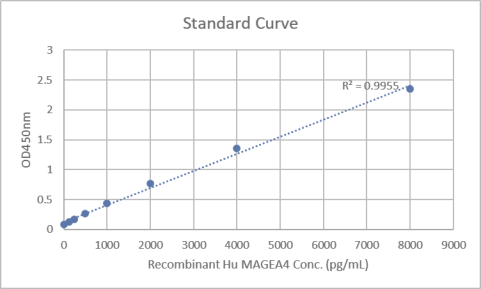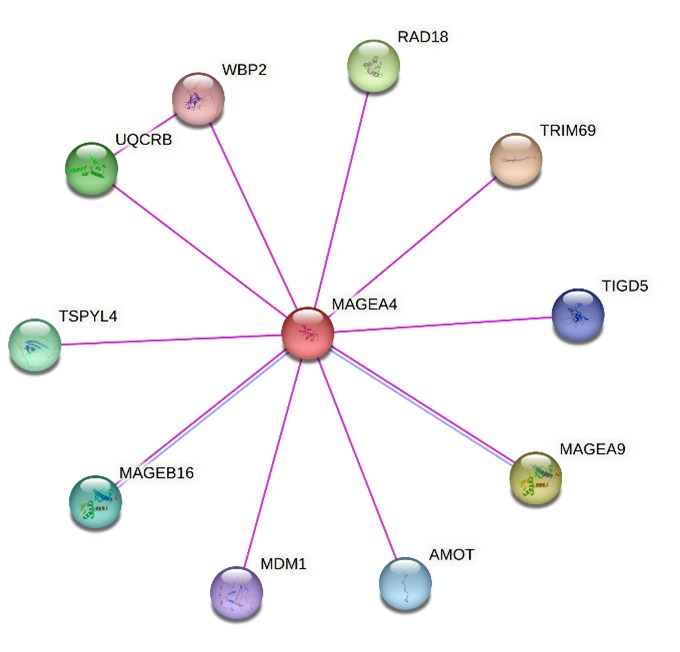MAGE-A4: Promising Target for Cancer Immunotherapy Research
MAGE-A4 is a cancer-testis antigen that is normally only expressed in immune-privileged sites in healthy tissue. However, it is expressed in several solid tumors, including those of the lung, bladder, head and neck, ovary, esophagus, and synovial sarcoma. 1, 2 MAGE-A4 can inhibit the tumor suppressor p53, which can contribute to tumorigenesis.3 MAGE-A4 is an attractive target for immunotherapies, such as T-cell therapy. For example, afamitresgene autoleucel (TECELRA) is a genetically modified T cell immunotherapy that targets MAGE-A4. It was recently approved by the FDA for adults with unresectable or metastatic synovial sarcoma.
Featured Products:
Mouse Monoclonal AntibodyClone ID: OTI1F9 |
Full-length Human Recombinant Protein |
ELISA Kit |
|---|---|---|
|
|
|
|
|
|
|
|
Featured News:
MAGE-A4 mouse monoclonal antibody clone OTI1F9, licensed from OriGene is part of recently approved MAGE-A4 IHC 1F9 pharmaDx assay from Agilent Dako for IVD use in the detection of MAGE-A4 protein in FFPR synovial sarcoma tissue. Read more here.
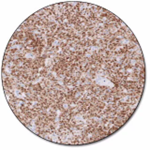
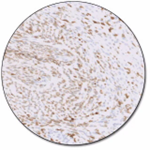
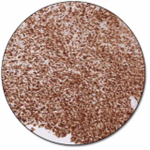
Stained Synovial sarcoma specimen (Source: MAGE-A4 IHC 1F9 pharmDx Agilent Dako)
Featured Citated Products:
Mouse Monoclonal Antibody Clone ID: OTI1F9 ()
OriGene's MAGE-A4 antibody products are crucial in MAGE-A4 research, as demonstrated by their frequent citations in well-reputed journals. David S. Hong et al. from University of Texas MD Anderson Cancer Center used the MAGEA4 mouse monoclonal antibody clone OTI1F9 (TA505362) in MAGE-A4 IHC staining on FFPE biopsy tissues from patients enrolled in phase 1 trails (NTC03132922)1. The IHC test was one of the pre-screening patient evaluations for this study.

MAGE-A4 IHC stain (DAB-brown) and H&E stain on ovarian tumor biopsy.
(Source: https://www.nature.com/articles/s41591-022-02128-z)
Similarly, Tianjiao Wang et al. from the Adaptimmune used the MAGEA4 mouse monoclonal antibody clone OTI1F9 (TA505362) in MAGE-A4 testing of tumor samples via a MAGE-A4 IHC clinical trial assay (NCT02636855 NCT04044768)2.
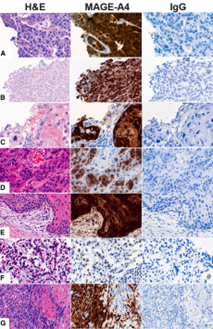
Representative images of histological and MAGE-A4 staining in different screened cancers- esophagogastric junction (A), melanoma (B), non-small cell lung sarcoma (C), urothelial (D), head and neck (E), myxoid/round cell liposarcoma (F), and synovial sarcoma (G).
(Source: https://www.cell.com/molecular-therapy-family/methods/fulltext/S2329-0501(24)00081-0)
Full-length Human MAGE-A4 Recombinant Protein ()
OriGene’s MAGE-A4 recombinant protein has been used as capture antigen in ELISA assay to evaluate antibodies against MAGE-A4 in patients sera with Lung cancer4 and Ovarian cancer5.
Interacting Proteins for MAGE-A4
Top 10 STRING interactants based on experimental score.
OriGene offers a range of tools for analyzing MAGE-A4
Interested in other MAGE family gene? Click Here
References
- Autologous T cell therapy for MAGE-A4+ solid cancers in HLA-A*02+ patients: a phase 1 trial. Hong et al. - Nature Medicine – 2023
- Identifying MAGE-A4-positive tumors for TCR T cell therapies in HLA-A∗02-eligible patients. Wang et al. - Molecular Therapy - Methods & Clinical Development – 2024
- The Melanoma-Associated Antigen Family A (MAGE-A): A Promising Target for Cancer Immunotherapy? Alsalloum et al. - Cancers – 2023
- Case-Control Study: Smoking History Affects the Production of Tumor Antigen–Specific Antibodies NY-ESO-1 in Patients with Lung Cancer in Comparison with Cancer Disease–Free Group. Myšíková et al. - Journal of Thoracic Oncology – 2017
- Expression of tumor antigens on primary ovarian cancer cells compared to established ovarian cancer cell lines. Kloudová et al. - Oncotarget - 2016

![Immunohistochemical staining of paraffin-embedded testis using anti-MAGE-A4 C/N TA505362 clone OTI1F9 mouse monoclonal antibody. HIER TEE buffer pH9 ([B21-100]) at 110C for 10 min, anti-MAGE-A4 diluted to 1:50. Detection was done with Polink1 Broad Mouse and Rabbit C/N [D11-18] with DAB Kit. Image 40x magnification.](https://cdn.origene.com/catalog/product/assets/images/antibody/primary-antibody/100/ta505362-101-h.jpg)
![Immunohistochemical staining of paraffin-embedded bladder cancer using anti-MAGE-A4 C/N TA505362 clone OTI1F9 mouse monoclonal antibody. HIER TEE buffer pH9 ([B21-100]) at 110C for 10 min, anti-MAGE-A4 diluted to 1:100. Detection was done with Polink1 Broad Mouse and Rabbit C/N [D11-18] with DAB Kit. Image 40x magnification.](https://cdn.origene.com/catalog/product/assets/images/antibody/primary-antibody/100/ta505362-102-h.jpg)
![Immunohistochemical staining of paraffin-embedded MAGE-A4 cDNA expressing CytoSections ([TS418952]) using anti-MAGE-A4 C/N TA505362 clone OTI1F9 mouse monoclonal antibody. HIER TEE buffer pH9 ([B21-100]) at 110C for 10 min, anti-MAGE-A4 diluted to 1:100. Detection was done with Polink1 Broad Mouse and Rabbit C/N [D11-18] with DAB Kit. Image 40x magnification.](https://cdn.origene.com/catalog/product/assets/images/antibody/primary-antibody/100/ta505362-103-h.jpg)
![Immunohistochemical staining of paraffin-embedded negative control CytoSections ([TC400001]) using anti-MAGE-A4 C/N TA505362 clone OTI1F9 mouse monoclonal antibody. HIER TEE buffer pH9 ([B21-100]) at 110C for 10 min, anti-MAGE-A4 diluted to 1:100. Detection was done with Polink1 Broad Mouse and Rabbit C/N [D11-18] with DAB Kit. Negative control [TC400001] shows no staining as predicted. Image 40x magnification.](https://cdn.origene.com/catalog/product/assets/images/antibody/primary-antibody/100/ta505362-104-h.jpg)
![HEK293T cells were transfected with the pCMV6-ENTRY control (Cat# [PS100001], Left lane) or pCMV6-ENTRY MAGEA4 (Cat# [RC223991], Right lane) cDNA for 48 hrs and lysed. Equivalent amounts of cell lysates (5 ug per lane) were separated by SDS-PAGE and immunoblotted with anti-MAGEA4(Cat# TA505362). Positive lysates [LY423276] (100ug) and [LC423276] (20ug) can be purchased separately from OriGene.](https://cdn.origene.com/catalog/product/assets/images/antibody/100/ta505362-1-w.jpg)
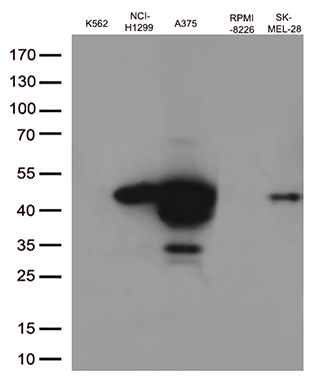
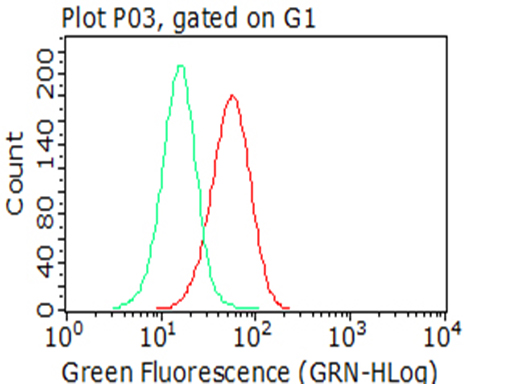
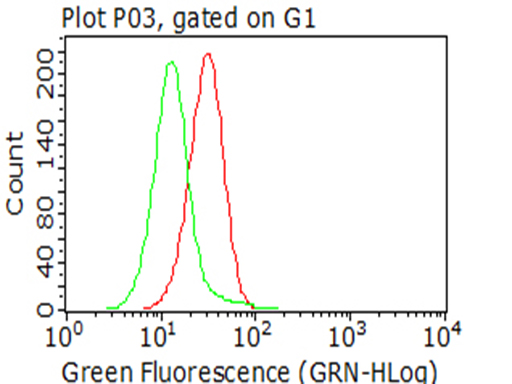
![Coomassie blue staining of purified MAGEA4 protein (Cat# TP318952). The protein was produced from HEK293T cells transfected with MAGEA4 cDNA clone (Cat# [RC218952]) using MegaTran 2.0 (Cat# [TT210002]).](https://cdn.origene.com/catalog/product/assets/images/proteins/tp318952.jpg)
